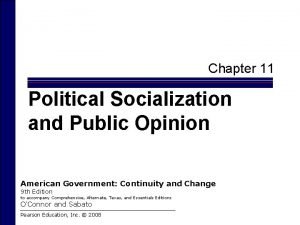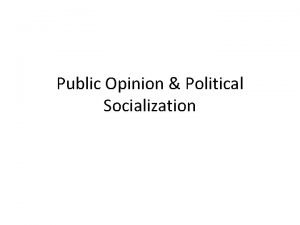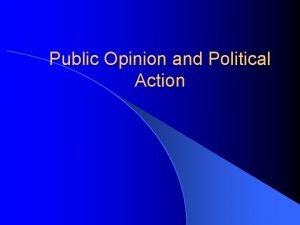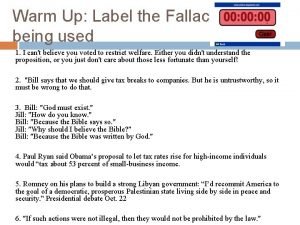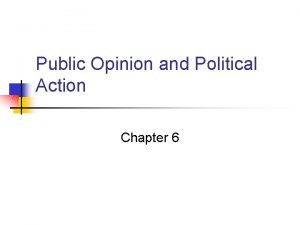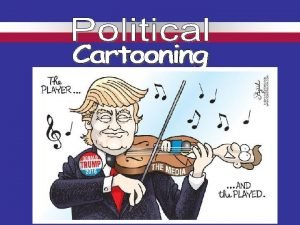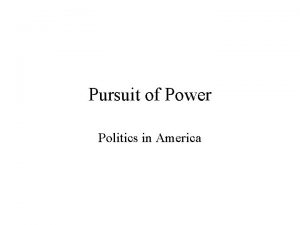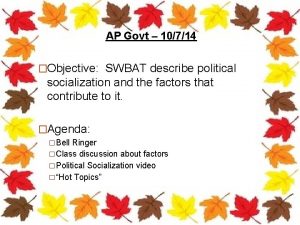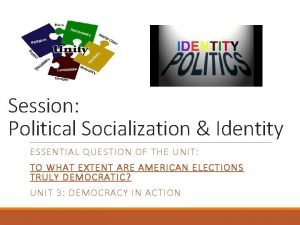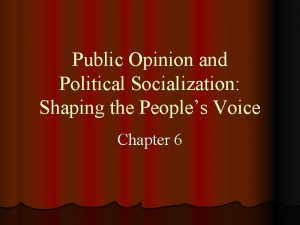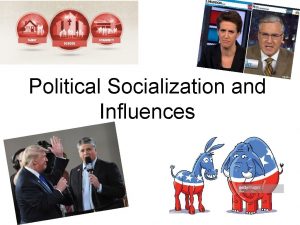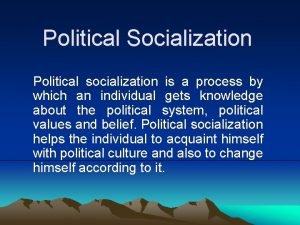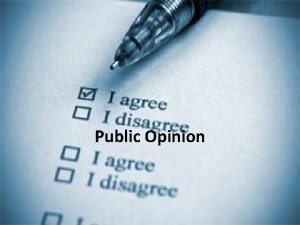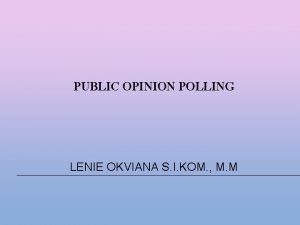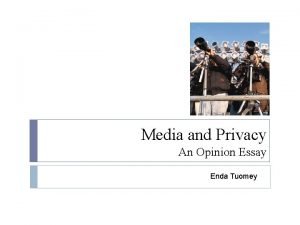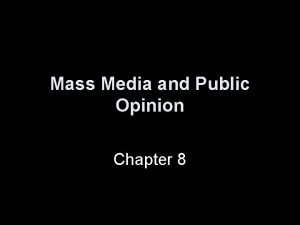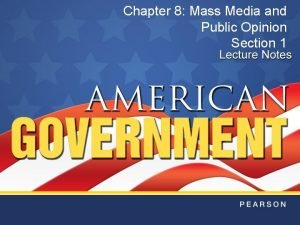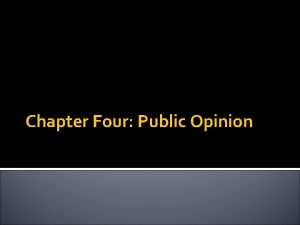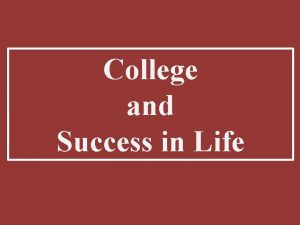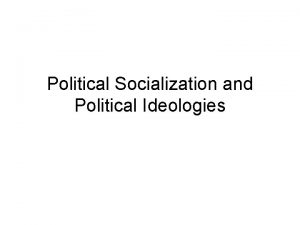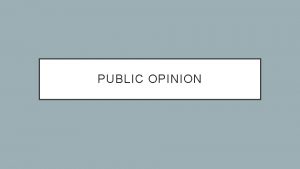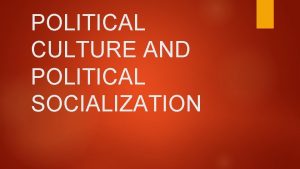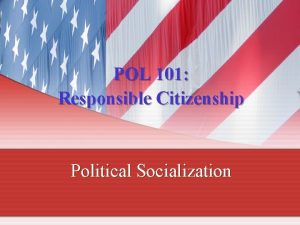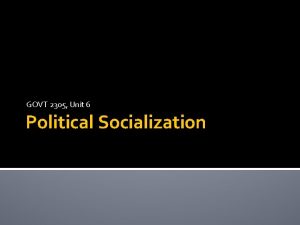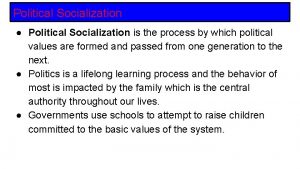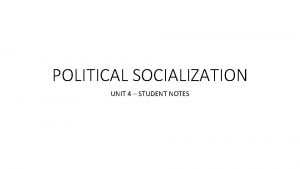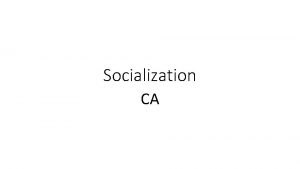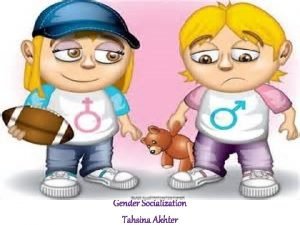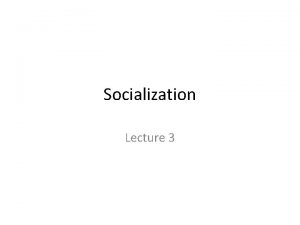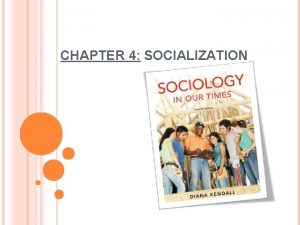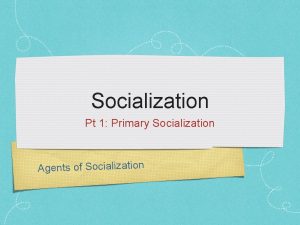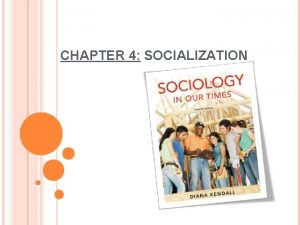Public Opinion Political Socialization How Powerful Is Public

Public Opinion & Political Socialization

How Powerful Is Public Opinion? • At various times in the recent history of the United States, public opinion has played a powerful role in presidential politics. • Vietnam War • Watergate break-in • War on Terror • In most situations, legislators, politicians, and presidents use public opinion to shore up their own arguments. It provides a kind of evidence for their own point of view. If the results of polls do not support their positions, they can either commission their own polls or ignore the polls.

Defining Public Opinion • There is no one public opinion, because there are many different “publics. ” • Public opinion is defined as the aggregate of individual attitudes or beliefs shared by some portion of the adult population. • Often, the public holds quite a range of opinions on a topic, making it difficult to discern what kinds of policies most Americans might support.

How is public opinion made known in a democracy? Protests Elections Initiatives Referenda Lobbying Interest group activities Writing letters to our elected officials Countless articles in magazines and newspapers and continuing electronic media coverage of the above. • Polls • •

• There are very few issues on which most Americans agree. • When a large portion of the American public appears to express the same view on an issue, we say that a consensus exists, at least at the moment the poll was taken. • Issues on which the public holds widely differing attitudes result in divisive opinion. • If there is no possible middle position on such issues, we expect that the division will continue to generate political conflict.

• Public opinion can be defined most clearly by its effect. – In order for public opinion to be effective, enough people have to hold a particular view with such strong conviction that a government feels its actions should be influenced by that view.

When does private opinion become public opinion? • When the opinion is publicly expressed and if it concerns public issues • When someone’s private opinion becomes so strong that the individual is willing to go to the polls to vote for or against a candidate or issue • When someone is willing to participate in a demonstration • Discuss issue at work • To speak out on local television or radio talk show. • Or to participate in the political process in any one of a dozen other ways.

The Qualities of Public Opinion: • Intensity: How strongly people are willing to express their private opinion determines the intensity of public opinion. • Fluidity: Public opinion can change drastically in a very short period of time. When this occurs, we say that public opinion is fluid. – Fluidity in public opinion reflects public awareness of government policy and in turn influences government decision making.

• Stability: Many individual opinions remain constant over a lifetime. Taken together, individual opinions that constitute public opinion may also be extremely stable, persisting for many years. • Relevance: Relevant public opinion for most people is simply public opinion that deals with issues concerning them. Of course, relevance changes according to events. • Political Knowledge: People are more likely to base their opinions on knowledge about an issue if they have strong feelings about the topic. Just as relevance ad intensity are closely related to having an opinion, individuals who are strongly interested in a question will probably take the time to read about it.

• Political Knowledge Cont. • Americans are likely to forget political information quite quickly. Facts that are of vital interest to citizens in a time of crisis lose their significance after the crisis has passed. • If political information is perceived to be of no use to an individual or is painful to recall, it is not surprising that facts are forgotten. It is disconcerting to learn, however, that Americans have little or no information about policy decision that have the potential to change our world. • Politicians can use this lack of interest to justify either voting as they see fit or opposing any initiative.

Measuring Public Opinion: Polling Techniques • The most important principle in sampling, or poll taking, is randomness. Every person should have a known chance, and especially an equal chance, of being sampled. If this happens then a small sample should be representative of the whole group, both in demographic characteristics (age, religion, race, living area, and the like) in opinions. • Choosing a random selection of phone numbers and interview the respective households produces a relatively accurate sample at a low cost. • Internet polls are not random and results are not accurate • Quota sampling (survey researchers decide how many persons of certain types they need in the survey) is often not only less accurate, but often may be biased. • Usually the Gallup or Roper polls interview about 1500 individuals and their results have a very high probability of being correct – within a margin of 3 percentage points.

Problems with polls • Public opinion polls are snapshots of the opinions and preferences of the people at a specific moment in time and as expressed in response to a specific question. • Sampling errors – polls may report erroneous results because the pool of respondents was not chosen in a scientific manner (the sample may be too small to overcome sampling error). • Unscientific mail-in polls, telephone call-in polls, and polls completed by the workers in a campaign office are usually biased and do not give an accurate picture of the public’s views. • When a poll changes its method from reporting the views of eligible voters to reporting those of likely voters, the results are likely to change dramatically.

• The results of a poll will depend on the questions asked: • Respondent’s answers are influenced by the order in which they are asked, the types of answers they are allowed to choose, and in some cases, by their interaction with the interviewer. To some extent, people try to please the interviewer. • Push Polls – are those in which the respondents are given misleading information in the questions to get them to vote against a candidate.

POLITICAL SOCIALIZATION

Political Socialization • most views that are expressed as political opinions are acquired through a process known as political socialization. The most important influences in this process are the following:

– The Family is the most important force in political socialization. • Children usually are of the same party as their parents, especially if both parents are politically active and share their political identity. • When children first vote, they usually tend to vote in line with their parents’ views. As they get older, they are likely to become more and more independent of their parents’ political views. – The educational environment and achievement of the individual • Generally, education is closely linked to political participation; the more education a person receives, the more likely they will be interested in and actively participate in the political process.

• Peers – the child’s friends become an important influence on behavior and attitudes. • For the most part, associations among peers are nonpolitical. Political attitudes are more likely to be shaped by peer groups when the peer groups are involved directly in political activities.

• Religion – religious associations tend to create definite political attitudes, although why this occurs is not clearly understood. • Roman Catholics tend to be more liberal on economic issues than are Protestants • Jews are more liberal on all fronts than Catholics and Protestants. • Northern white Protestants are more likely to vote Republican, whereas Northern white Catholics more often vote Democratic. • Everywhere in the U. S. , Jews mostly vote Democratic. • Sometimes a candidate’s religion enters the political picture – John F. Kennedy (1960 election candidate) -- Catholic – Baraka Obama (2008 election candidate)—Muslim?

• Economic status and occupation – how wealthy you are and the kind of job you hold are also associated with your political views. • Poorer people are more inclined to favor government social welfare programs but are likely to be conservative on social issues such as abortion. • The upper middle class is more likely to hold conservative economic views but to be tolerant of social change. • People in lower economic strata also tend to be more isolationists on foreign policy issues and are more likely to identify with the Democratic Party and vote for Democratic candidates. • Support for civil liberties and tolerance of different points of view tend to be greater among those with higher social status and lower among those with lower social status (probably it is educational differences more than the pattern of life at home or work that account for this).

• Political Events – people’s political attitudes may be shaped by political events and the nation’s reaction to them. • When events produce a long-lasting political impact, generational effects result. • Generational effects occur only when the event is a true crisis that changes the life of the nation (ex) Great Depression, Vietnam War) • Sustained periods of economic prosperity or decline can influence the youngest generation of voters to feel an attachment to the party in power at the time. • Opinion Leaders – We are all influenced by those with whom we are closely associated or whom we hold in great respect – friends at school, family members, and other relatives, teachers, ad so on.

• Media Influence – newspapers, television, radio broadcasts, and internet sources strongly influence public opinion (biases come out here) • Since the media informs the public about the issues and events of our times and thus have an agenda-setting effect. • Today, many contend that the media’s influence on public opinion is increasing to the point that the media are as influential as the family in regard to public opinion. – Gender Gap – • Women tend to vote Democratic • Women also appear to hold different attitudes from their male counterparts on a range of issues other than presidential preferences. • Women are more likely to oppose capital punishment as well as the use of force abroad. • Studies have shown that women are more concerned about risks to the environment, more supportive of social welfare, and more supportive of extending civil rights to gay men and lesbians than are men.

• Race and Other Demographic Traits • African Americans tend to be more liberal than whites on social welfare issues, civil liberties, and even foreign policy. • Party preference and voting among African Americans since the 1930 s have supported the Democrats very heavily. • A person’s age has comparatively little impact on political preferences. • Attitudes vary from region to region, although such patterns probably are accounted for mostly by social class and other differences. Regional differences are relatively unimportant today. • More important than a region is a person’s residence – urban, suburban, or rural) – Big cities tend to be more liberal and Democratic because of their greater concentration of minorities and newer ethnic groups. – Smaller communities are more conservative and in many areas, Republican.
- Slides: 22
